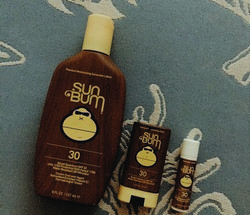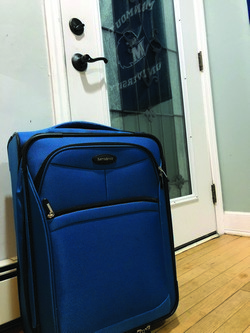Winter is coming and temperatures are beginning to drop, but that doesn’t mean the sun isn’t still shining, or that you shouldn’t be wearing SPF. Although it may seem that the sun is not as strong during the colder months, protecting your skin from UV-rays is a year round process.
James Mack, Ph.D., a biology professor, explained the difference between two main types of radiation that the sun emits. “The sun emits visible light and ultraviolet (UV) radiation. The two types of radiations are UVA and UVB. UVA radiation accounts for approximately 95 percent of UV radiation that reaches our skin,” said Mack.
Although UVA radiation accounts for most of the radiation that reaches our skin, UVB radiation is not to be ignored. “Our DNA can absorb both UVA and UVB radiation and cause skin damage. UVB radiation does not penetrate deeply into our skin but can cause significant damage to our DNA causing mutations leading to skin cancers (basal cell carcinoma, squamous cell carcinoma and melanoma),” said Mack.
Brielle Saunderson, a junior nursing student, said, “Sunscreen is really crucial in protecting your skin from harsh UV rays no matter what time of the year.”
She added, “The skin is your body’s big organ so it is crucial to protect your chances of getting from cancer.”
Exposure to the sun never stops, so protecting your skin from UV damage shouldn’t either. Everyone dreams of growing older without wrinkles or sunspots, and many look to expensive creams to prevent them.
What many do not realize is that sunscreen, can do the same thing (if not better). Mack continued, “UVA radiation penetrates our skin to the deeper layers and can produce free radicals which damage DNA, proteins and cells leading to premature aging of our skin. UVA radiation destroys a major protein in our skin called collagen. This leads to loss of elasticity causing wrinkles and the visible signs of aging.”
If you don’t know what kind of SPF to purchase, Mack suggests you find sunscreens that have passed the FDA’s Broad Spectrum Test for UVA and UVB radiation. “To protect our skin we need to use a Broad Spectrum sunscreen that blocks both UVA and UVB Radiation,” said Mack.
The amount of times you should re-apply sunscreen depends on many factors. Kathy Maloney, Director of Health Services at Monmouth University, said, “Climate, how long you are in the sun, and what parts of the body are being exposed,” all are components to how much, and how many times you apply SPF.”

Colleen Moretti, a senior communication student who is passionate about skincare, makes sure to protect her skin even after summer has ended. “I’d have to say that wearing sunscreen in the winter is just as important as in the summer. Personally, I use a moisturizer with SPF in it so year-round it is good for your skin and protects it even though the sun isn’t as strong during the winter,” said Moretti.
In New Jersey, the sun reaches its peak from around 10 a.m. to 4 p.m., a time-frame causing many to be exposed to sunlight during their commute. Just because you are inside of your car, does not mean you are protected from the sun. “UVA rays can penetrate glass while UVB cannot. People must be careful sitting, for a long time, next to a window unless the glass is specially treated for UVA radiation,” said Mack.
It’s not a secret that winter activities, and sports are harsh on the skin. When it snows, exposure to UV rays is increased. “UVB radiation is the main cause of sunburn. UVB radiation is reflected off water, sand and snow. This should be of concern when we are on the ski slopes especially on sunny days,” said Mack.
As college students, we often overlook sunscreen as a part of our daily routine. In order to reduce wrinkles, skin spots, aging, and skin cancer, take care of your skin in the best way possible.
Do not let the winter months fool you; sunscreen is still important to your daily routine so be sure to always protect yourself from the sun’s rays.
PHOTO’S TAKEN by Chloe Barone




